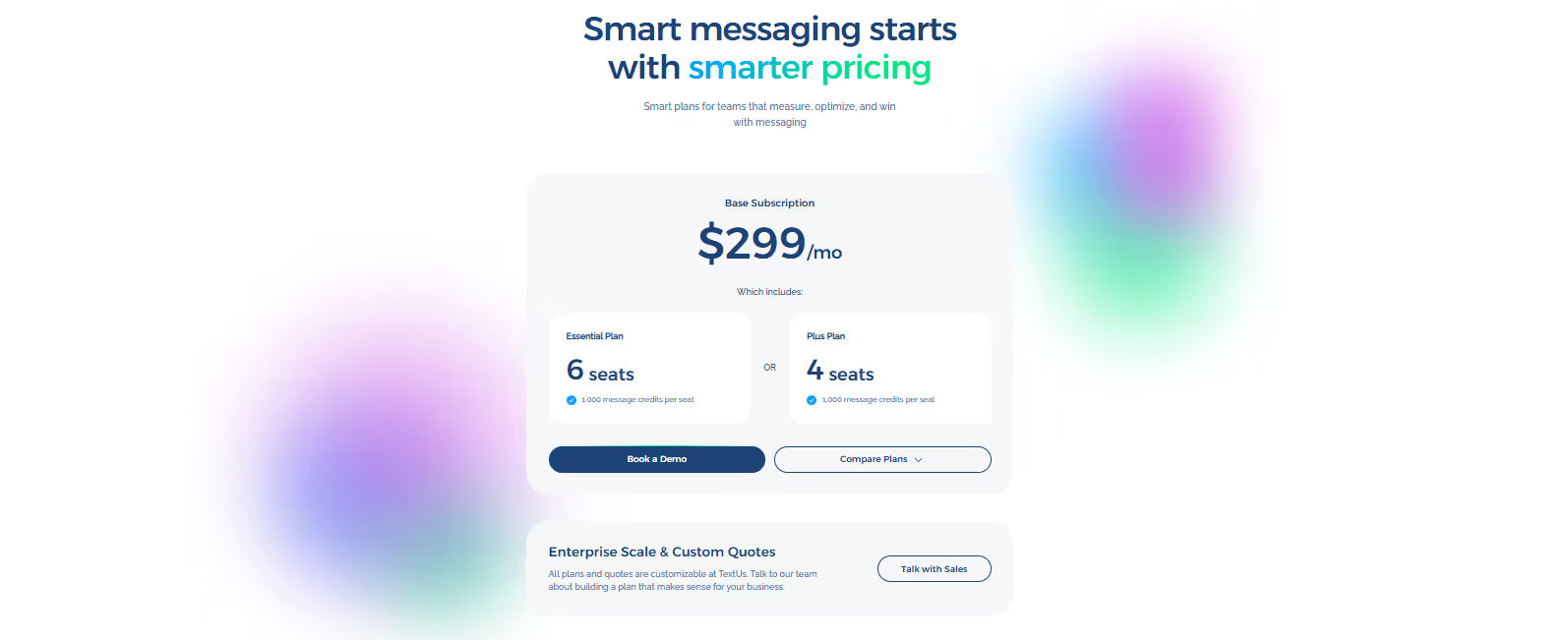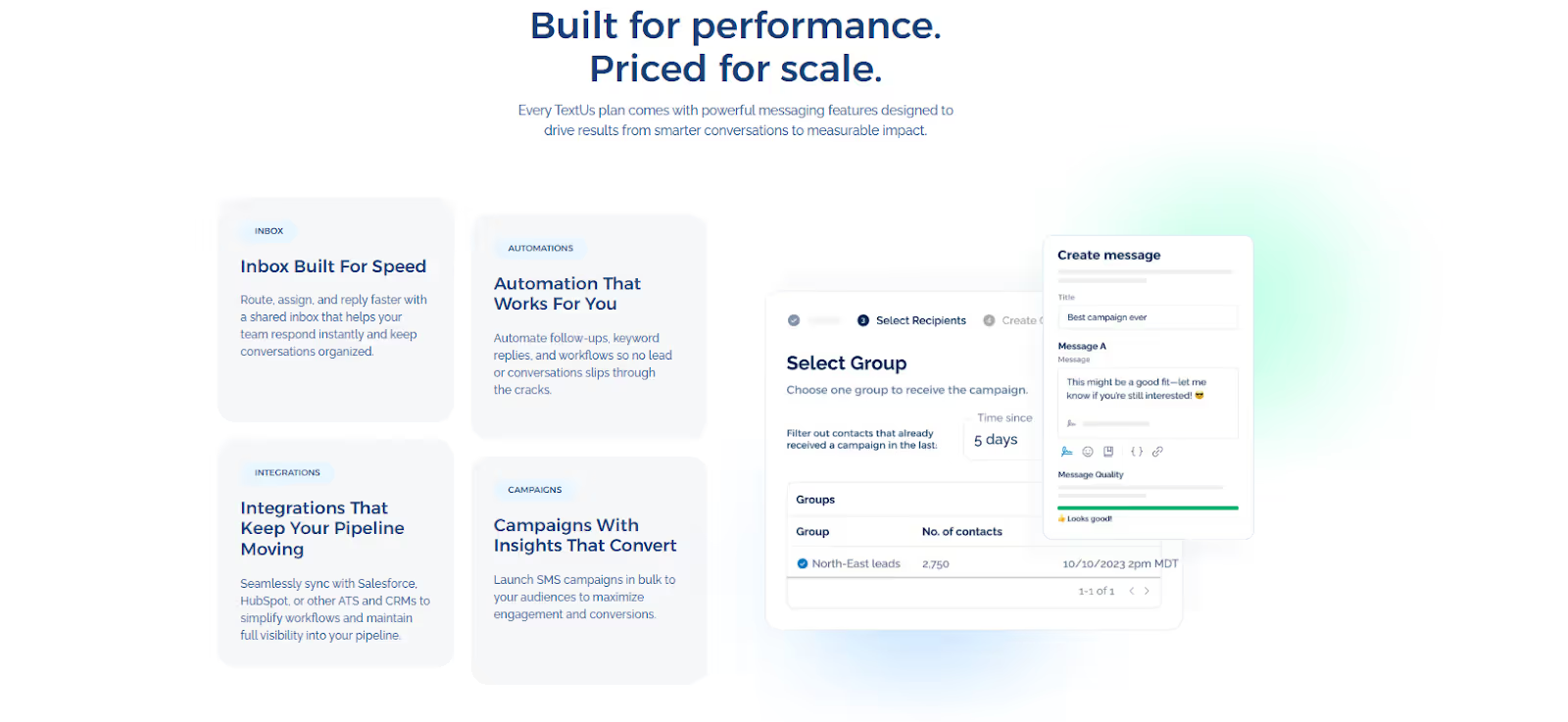SMS Marketing Pricing: How to Stay Cost-Effective in 2026

When you decide to start texting customers, one of the first questions that comes up is, “How much does SMS marketing cost?”
The total cost of your SMS marketing depends on message volume, country, and provider setup. That’s why understanding text marketing pricing is important before launching your first campaign.
In this guide, we will provide an overview of how SMS marketing pricing works, what factors affect it, and how to choose a plan that fits your goals.
Average SMS Marketing Pricing in 2026
If you’re planning to start or expand your SMS marketing campaigns, you need to familiarize yourself with the average SMS pricing so that you can budget wisely. While costs differ between texting software, the current market range is enough to help you make informed choices.
The price per SMS message in 2026 generally falls between $0.01 and $0.05 per SMS, depending on message length, country, and platform. MMS, which includes images, videos, or long text, costs a bit more, usually between $0.03 and $0.30 each.
Many providers use a hybrid pricing model, where pricing adjusts based on your usage volume. The more you send, the less you pay per message.
For example, a pricing plan for 1,000 messages might cost around $25, while a 10,000-message plan might bring that per-message rate down to $0.02 or less.
Businesses using mass texting or ecommerce brands with frequent promotions often benefit most from this setup.
How SMS Marketing Pricing Impacts Your ROI
Price influences how far your SMS marketing campaigns can go and how much profit your campaign can bring back. Spending too little can limit your reach, while spending without a plan can waste your budget fast.
The secret to getting the most from your text campaigns is balancing your pricing strategy with your return on investment (ROI). If you track your key performance indicator (KPI) metrics, you will see where every dollar goes and how much it earns back.
For example:
A small fitness studio used an SMS platform that cost $0.025 per message. They sent around 5,000 text messages per month promoting new member offers, spending roughly $125 per month.
Those texts brought in 20 new sign-ups, each worth $30 in monthly membership fees. The result is $600 in new monthly revenue, nearly five times what they spent.
When you know your costs, you can predict your profits and scale your campaigns wisely. That’s what makes understanding SMS marketing so valuable.
But here’s something most businesses miss: not every provider is transparent about charges. Some add additional messages or other hidden fees. Others charge more based on destination country, message type, or add-ons like dedicated short code options.
Finally, remember that the cheapest option isn’t always the smartest one. You can spend a few cents more per text and still save money by getting better delivery, stronger reporting, and chat support when you need it.
How to Calculate Your SMS Marketing ROI
When you invest money in any marketing strategy, you may eventually question if it pays off. With SMS marketing, the answer is yes, but only if you understand how to measure and maximize your ROI.
ROI measures how much profit you earn compared to what you spend. Because every SMS message has a direct cost, it also has the power to create instant engagement and quick results.
You can figure out your SMS marketing ROI in just a few quick steps:
- Calculate total spending: Add up everything you’ve paid for your SMS campaign. Include your platform subscription, message costs, and any extra charges such as automation or analytics tools.
- Measure total earnings: Determine how much money your texts brought in from sales, bookings, or leads that came from your campaigns.
- Find your net gain: Subtract your total spending from the amount you earned. The result shows the profit generated from your text marketing.
- Work out your ROI: Use this simple formula:
ROI = (Net Gain ÷ Total Spending) × 100
This percentage shows how much return you’re getting for every dollar spent on SMS marketing and helps you decide if your campaigns are performing well.
Platforms that offer unlimited contacts, detailed SMS segment reporting, and rollover credits make it easier to maintain predictable costs while keeping performance high.
Factors That Affect SMS Marketing Cost
The cost of SMS marketing depends on several moving parts, from how many messages you send to what kind of provider you choose. Below are the main things that shape your SMS marketing pricing.
Message Volume and Frequency
The number of messages you send each month has the biggest impact on your total cost. Most providers use tiered pricing, meaning the more messages you send, the cheaper each text becomes.
For example, if you send 1,000 messages, you pay around $25 total, which is about 2.5 cents per message. But if you send 10,000 messages a month, that per-message rate can drop closer to 2 cents or less.
If your business sends texts regularly, a monthly plan saves you money compared to paying per text. For some providers, one SMS segment determines message cost so that longer texts count as multiple messages.
Also, don’t forget to account for incoming replies. Some platforms charge for both outgoing and incoming messages, while others only bill for messages you send out. Always check how your provider counts messages before committing to a plan.
Country and Carrier Fees
Where your messages are sent also affects pricing. Sending SMS in the United States is typically cheaper than sending them internationally because of mobile carriers and routing fees.
For example, local texts might cost between 1 and 3 cents each, while messages sent overseas can range from 5 to 10 cents or more.
These differences come from carrier agreements and regulatory requirements. Some providers include these fees in their standard rates, while others add them later as separate charges.
SMS Gateway and Platform Provider
The SMS marketing platform you use plays a huge role in your total spend. Each provider sets its own pricing structure.
Developer-focused tools like Twilio use a pay-as-you-go model, where you pay for every message plus small carrier fees.
TextUs uses a subscription-based pricing model that starts at around $299/month, which includes a set number of SMS credits and seats. Plans are customizable based on message volume, seats, and features.
If your company prefers to use long codes, SMS short codes, or a toll-free number for outreach, that can also impact pricing. These options offer flexibility for different use cases, from one-on-one conversations to mass messaging.
Recommended Reading: Know the Difference: Short Codes vs Long codes vs Toll-free Numbers
Type of Message Sent
The type of message also influences what you pay. If you send MMS messages that include images, GIFs, or videos, expect to pay a bit more due to higher MMS pricing.
These messages can range from 3 to 30 cents each, depending on your provider. The upside is that visual messages usually grab more attention, leading to better click-through and conversion rates.
Additional Features
Beyond sending messages, many SMS marketing platforms include extra tools, and these can affect your SMS marketing pricing. Common add-ons include:
- Automation and scheduling, which allow you to send text messages at set times automatically
- Reporting and analytics to measure open rates, clicks, and campaign performance
- Integrations with tools like Salesforce or HubSpot for seamless contact syncing
- Dedicated numbers or SMS keywords (like “JOIN” or “TEXTNOW”) that help customers opt in easily
A slightly higher price per month might save you money in the long run if it includes features that help you manage campaigns more smoothly without paying for constant upgrades.
SMS Marketing Pricing Models
Pricing varies across providers, but they generally fall into three main types. Each has its own structure and works better for different campaign goals.
Pay-As-You-Go Pricing
If you are new to text marketing or just starting to test how customers respond to your text message, pay-as-you-go pricing is the simplest way to begin. You only pay for the texts you send, which gives you complete control over your spending and campaign pace.
This setup is useful for small businesses, seasonal promotions, or any situation where your messaging volume changes frequently.
However, this flexibility usually comes at a higher per-message rate compared to subscription or standard plans. Some providers may ask for a registration fee or require a credit card to get started.
Monthly Subscription Plans
Instead of paying for individual messages, you pay a flat monthly cost for a set number of texts. It works well if you rely on consistent communication.
Many subscription plans also include access to automation tools, message scheduling, and reporting dashboards that track your campaign results. Some even allow multiple numbers to manage different teams or departments.
But you may need to assess how many messages you typically send each month. If your volume fluctuates, you might pay for unused credits or other fees tied to plan limits.
Tiered or Volume-Based Pricing
This is where the cost per message decreases as your message volume increases. It’s ideal if your business is growing and you're expecting your texting needs to rise over time. Providers also offer volume discounts as part of this model.
In a tiered system, pricing is divided into levels. Each level covers a specific range of message volumes, and the rate per message drops as you move into higher tiers.
Before committing to a plan, you have to review your average message volume from previous campaigns. If you notice steady growth month over month, a tiered model can help you save in the long run.
Custom Enterprise Pricing
If your business handles large-scale communication across multiple teams, departments, or regions, you may need a custom plan. This type of pricing is designed for organizations that send a high volume of messages and require specialized features, integrations, and support.
Enterprise clients often choose a fixed number or specialized number type to maintain brand consistency and compliance with industry regulations. Some legacy plans also remain available for businesses using older setups.
TextUs provides enterprise-scale plans with flexible, custom pricing. Every business has unique texting needs, from the number of users to automation depth and integration requirements. This SMS platform lets you design a plan that fits your specific workflow.
How TextUs Delivers More Value for Your SMS Investment
With TextUs, you get a pricing and feature set that aims to give your business more control and more value from each message you send.

TextUs follows a subscription-based model starting at $299 per month, which includes a base phone number, 6 user seats, and access to its text message marketing tools. This structure gives you an understanding of what you’ll pay each month.
Every plan, from Essential up, includes:
- Two-way messaging
- Shared inboxes for the sales team
- SMS campaign tools
- 10-digit texting number included
- 1,000 message credits monthly per seat
While the Essential plan covers the basics, TextUs also offers the Pro Plan. It unlocks richer features like unlimited keywords, unlimited automated sequences, integrations, API access, and toll-free/short-code eligibility.
With TextUs, you’re buying a system where messaging and management go hand in hand. The monthly fee gives you a predictable cost for budgeting. The included features give you the means to engage customers, track results, and scale future campaigns.
If you pick the right tier for your volume and needs, you’ll likely get more return from your SMS campaigns than you’d get from a basic, low-cost tool with fewer features.
Turn Your SMS Spend into Real Business Growth—Try TextUs!
The cost of SMS marketing isn’t just about how much you spend but also how much you gain from every automated text message.
With predictable pricing and powerful features built for real business communication, TextUs helps you turn every text into a measurable return.
Whether you’re sending appointment reminders, promotional campaigns, or customer updates, TextUs gives you everything you need to do it smarter, from automation to real-time conversations that convert.
You’ll see where your investment goes and how your texts perform, which makes your SMS marketing pricing not just affordable, but valuable.

Don’t settle for platforms that overcharge and underdeliver. Book a demo with TextUs today and build a plan that fits your business, your goals, and your budget!
FAQs About SMS Marketing Pricing
How much do SMS fees cost?
SMS fees depend on several factors, including the provider, the country you’re sending messages to, and the type of message you send.
In the United States, where most US carriers operate, SMS marketing costs between $0.01 and $0.05 per message. Some providers may require major credit cards for billing or add a fee for international routing or account setup.
Is SMS marketing's 98% open rate?
Yes, that statistic is widely supported across the industry. Research shows that SMS marketing has an open rate of around 98%, and most messages are read within minutes.
This is one of the main reasons businesses see such strong returns and more sales from relevant messages that reach customers fast. SMS marketing remains one of the most cost-effective ways to communicate with your audience.
How much does an SMS cost?
The cost of an SMS can vary based on your provider and how many texts you send. For small campaigns, you pay about 2 to 3 cents per message. Some providers also calculate rates based on message length, and every segment may add slightly to the cost.
As your volume grows, many platforms lower your rate per text. For instance, if you send tens of thousands of messages monthly, your rate could drop to 1 cent or less per message under a tiered pricing model.
Is SMS marketing legal in the USA?
Yes, SMS marketing is legal in the United States, but it’s regulated under the Telephone Consumer Protection Act (TCPA) and enforced by the Federal Communications Commission (FCC).
These regulations require businesses to obtain express written consent from recipients before sending marketing texts, offer an SMS opt-out option, and keep records of consent to stay compliant.
.avif)
Continue Reading
Frequently Asked Questions
Business Texting
Built for Results
Create and convert pipeline at scale through industry leading SMS software




